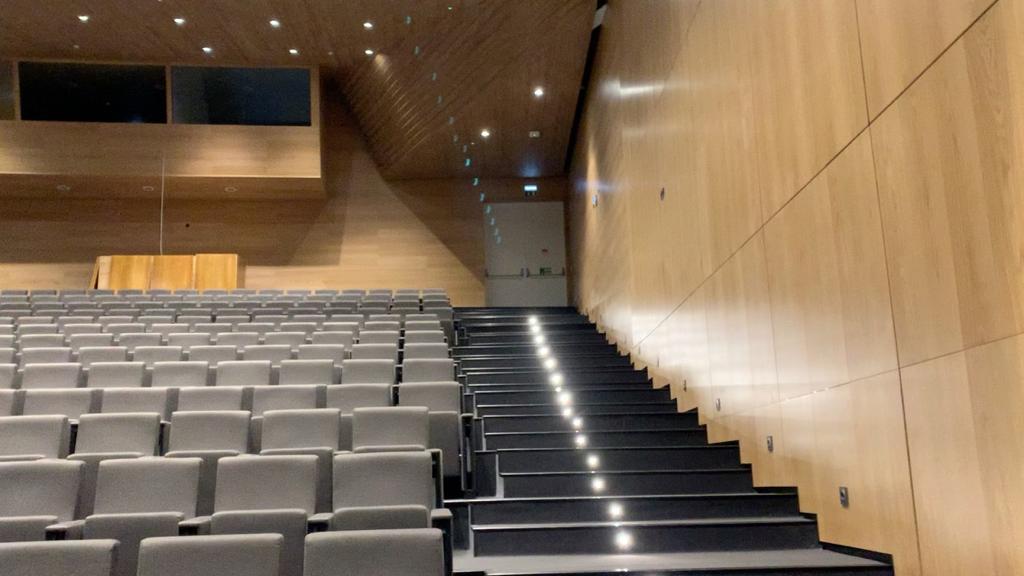In March I had the chance to attend Axians International Education Club’s first in-person event since lockdown, this time hosted by Axians Portugal where the weather wasn’t quite as good as in the UK (there’s a first!).
This club was founded by Axians Brand bringing together members from across the Axians network in Portugal, France, Germany, The Netherlands and the UK and a new member from Morocco who joinedus this year. The club gives those countries who deliver services to the Education sector a chance to review what each country is achieving individually and for us to work together to help address some of the high impact challenges the sector faces.
We share information, collaborate on ideas for growth, produce material that has international relevance and visit customers to hear how Axians has helped with their success. Globally Axians revenues in Research and Education are over €100m coming from a range of products and services such as Enterprise Networks, High Performance Computing, Smart Campus, consulting services, Exam as a Service, AI analytics applications that help reduce early-school dropouts and of course Cybersecurity.
Some examples of new customers in the last couple of years are the Mohammed VI Polytechnic University in Morocco, a €10m project for complete Campus IT including AV, storage, network technologies and Cybersecurity and Network as a Service for The Lanstede Group in the Netherlands
The club meeting gave us the opportunity to visit the new Lisbon HQ as well as the Network Operations Centre (NOC), Security Operations Centre (SOC) and warehousing facility. We also managed to find some time to socialise and share anecdotes around success, partnerships and challenges.
We were also privileged to visit two of Axians Portugal’s clients while we were in the Country, Nova School of Business and Economics situated by the sea in Cascais and Escola 42 in Lisbon.
I last visited the Nova campus when it was still under construction 4-years ago and now it’s fully occupied and delivering services to students. When Nova had the aspiration to build “the most attractive post-graduate business school in Europe” with very little money to meet the €50m budget required, they created a foundation, funded by Corporations and Alumni with a small investment from the Government along with a parcel of land 500 metres from the beach.
Nova’s vision was to utilise technology to help manage space, travel time and maximise the opportunity for learning and collaboration. They designed innovation hubs where businesses can come and gain the expertise of students to help them fulfil creative new challenges. The campus has areas that can be used for corporate events including a stage that can drop 2 storeys, large auditoriums and the central atrium area that has an opening roof to take advantage of the Mediterranean climate. The tunnel under the main road directly to the beach helps towards the “attractiveness” I’m certain but the Dean, Daniel Traça assured me the students don’t get time!
The campus layout, services and atmosphere is professional, well thought out and, as you can see, exam time is serious. In fact, despite this being a charming and creative place to learn, it’s also serious about delivering some of the greatest business students for the world’s new economy. The Dean clearly has his goal set on making the most of the facility and was excited to tell us just how many students come from overseas and how they now deliver extensive online learning to broaden their reach.
Whilst the visit to Nova inspired me to help create Smart Campuses in the UK, the next visit to Escola 42 truly got my creative juices flowing.
42 is an amazing network of schools across the world dedicated to training coding skills for anyone aged 17+. It’s free, anyone can apply, there are no teachers (only lifeguards to stop you sinking 😅) and no examinations; all projects are peer reviewed. There is a core curriculum where everyone learns to code in C and then specialist subjects that branch off in many directions.
We met with three students at 42 Lisboa who recounted their experiences with passion and enthusiasm. The “boot camp” is 26 weeks and, after completing enrolment papers you’re left to be independent. That means, logon to one of the room full of iMacs and start your first project – nobody tells you how to do it and most students (including the three we met) have never coded before. 42 teaches the discipline of self-learning and lets students un-tap their creativity.
What’s amazing to realise is that the first 42 was established in Paris in 2013 and that there are now 42 schools around the world, soon to be 43. I bet you hitchhikers can’t guess where the name 42 derived from? 😉
Head of Technology at 42 Lisboa, Paulo Rodrigues Da Silva, told us of another project the team are involved with that offers similar collaborative learning to secondary school students as extra-curricular topics such as animation, 3d modelling, robotics and game development. Tumo now has schools across Armenia where it was conceived and locations in 4 other countries, none in the UK.
I came away with so many takeaways to mention, but I guess what really resonated with me from the club meeting this time was, whilst Axians has a great deal to deliver the Education sector, we need to think outside the box and support those schemes ready to embrace a new style of learning. And, oh yes, come on UK, let’s see more projects that promote creativity like those I visited and heard about, I know of Coderdojo locations across the UK but there’s only one way to get access to the best talent and that’s to support the creation of it.



